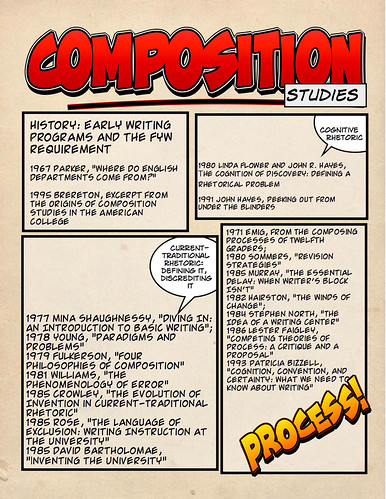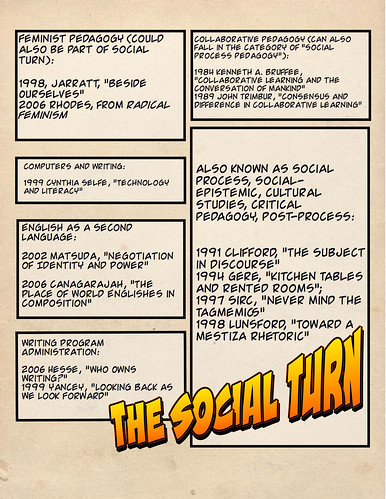I'm responding, past deadline, to Michael Faris's carnival prompt, in which he suggests that we read Geoffrey Sirc's "Resisting Entropy," a review essay published in College Composition and Communication's most recent issue.
Disclosure: I got my PhD at the University of Minnesota, and Geoff was on my dissertation committee. Knowing what I do of the institutional context here, I appreciate this article on a whole other level (not necessarily a higher level, to be sure). The U of M, for a very long time, offered first-year writing in three different departments: English, Rhetoric, and General College. I taught it in the rhetoric department: Rhetoric 1101 was the required course. English had their own course -- their graduate students taught a 1-1 load to our 2-1 in rhetoric -- and General College, a unit that mostly served underprepared students, had theirs. Geoff taught in General College for many years. "Pockets of expertise," the situation was called, until a c. 2005 "strategic positioning" plan, intended to make UMN one of the top three public research universities in the world, up there with UC Berkeley and the University of Michigan, was carried out by upper administration. When that happened, they did a lot of restructuring: consolidating some units, eliminating others. The General College was shut down, and a new unit, the Department of Writing Studies, was created. See this history by David Beard for more detail. Tenured professors had their lines transferred to other departments accordingly. Sirc is in the English department, not Writing Studies; my understanding is that he'd already made arrangements to have his line transferred to English prior to the formation of the new unit, so nothing personal. Still, my institutional memory informs my reading of parts like this on page 510:
You know what’s great? Henry James is great. You want to teach students how to be more conscious writers? Show them Henry James—what he wrote, how he wrote, what he thought about writing, his technologies of composition, and how they impacted his prose. “Writing studies,” you say? His is, indeed, writing worth studying. If you’re not going to teach a course exclusive of outside reading, why not use the most interesting reading there is? It’s long past time to revisit how and why literature became exiled from the composition classroom.
Yeah, so this response probably won't bring anything new to Sirc's argument; if you're looking for a dazzling critique, it's not happening here. OK, here are some other things that jumped out at me as I read:
"classroom practice based in the fantastic possibilities of form and content", p. 513
"interrogating all the forms and tools at their disposal," p. 515
"Choosing content from the entire cultural heritage of writing," p. 516
Like Kenneth Burke said in The Philosophy of Literary Form, "use all there is to use." Burke was talking about criticism, not writing classes, but both Burke and Sirc (via Hawk) are dealing with Coleridge, interestingly enough.
I like this resourceful approach to teaching writing (and everything else too) -- not closing off any category of texts. And in the longer quotation above, he's right about literature's place in the writing classroom! He's RIGHT. It makes me mopey about the situation writing program administrators face: the reality that not everyone thinks about composition pedagogy with the passion and seriousness that Sirc does, the warnings that if composition cedes any territory to literature, then first-year writing classes will become literature survey courses using essay exams, or worse, author-title-significance quotation-based short-answer exams. The dreaded slippery slope. I want to reject that argument, of course, but at the same time, it's true that some who teach FYW don't have quite the work ethic that one might like. Small wonder when we take working conditions into account, but I could see something like the slope happening. Besides, in the wrong hands, writing-about-literature classes can embody the same "bland, sanitized pedagogy" as the one "teaching clear, correct, citation-based essay form to students, using a literarily thin corpus of nonfiction readings as prompts" (511). Not that Sirc is putting literature out there as a silver bullet, certainly, but I've never understood the arguments for taking it out of writing classes entirely.
One of the highlights of the whole piece for me is on page 517: "Let me add, in sad disbelief, that some of the contributors to this volume actually have their undergraduate students read composition scholarship. Oh, my people, my people!" No comment.
Throughout the essay, I thought about the need for WAC as I read. It was nice to see Sirc acknowledge that at the end (518):
Until other departments are willing to take ownership for teaching students to do the writing in their field (either in first-year seminars or writing-intensive [WI] courses), it seems composition programs will remain a compromised, scapegoated service unit, having to fulfill their required, impossible mission by addressing presumed goals of academic writing, having students perfect the re-representation of thinly voiced, unimaginative prose, written in response to middlebrow nonfiction essays, in courses inflected more by politics than poetics, ideology rather than desire.
Sigh. By the way, I forgot to mention that earlier in the essay, Sirc addresses the conviction on the part of some writing teachers to try to awaken in their students a sense of civic engagement. For a long time, I accepted this responsibility at part of FYW. But really, why shouldn't it be everyone's responsibility? I still revere Lazere, but I don't buy this aspect of curriculum design anymore.





